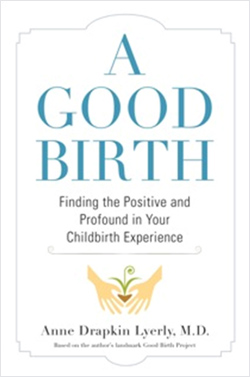 Dr. Anne Drapkin Lyerly, an obstetrician/gynecologist, researcher, bioethicist and author, is one of the founders of the Second Wave Initiative. Founded in 2009, the Second Wave Initiative aims to offer scientifically responsible solutions to pregnant women in need of medical treatment. We spoke to her to hear more about what she’s doing.
Dr. Anne Drapkin Lyerly, an obstetrician/gynecologist, researcher, bioethicist and author, is one of the founders of the Second Wave Initiative. Founded in 2009, the Second Wave Initiative aims to offer scientifically responsible solutions to pregnant women in need of medical treatment. We spoke to her to hear more about what she’s doing.
Why did you decide to found the Second Wave Initiative?
It came from two places. I’ve been both an obstetrician and gynecologist clinician, taking care of patients, and I’m also trained in bioethics and I review a lot of research studies. From the doctor’s side, I was increasingly frustrated about the profound lack of data when counseling patients who had worries and questions about whether or not they should use medication in pregnancy. We really didn’t have a lot of information to go on. I had to do a lot of research, pulling together some sketchy data. I was also interested in how fellow clinicians were reacting to the absence of data, which was sometimes simply to take people off their medication, which in many cases would do more harm than good. Or my colleagues outside of obstetrics would call me in the middle of a crisis and say “I have this pregnant woman who’s having an asthma attack, and I don’t know if this medicine is safe.”
From the research side, I reviewed a lot of studies that could have reasonably included pregnant women. Researchers would be surprised when I asked them “why are you not including pregnant women in your study?” They usually thought, “as long as I don’t include pregnant women I’m fine, I’m ethically on the high ground.” When I would ask them to justify their exclusion of pregnant women, they might say “ethics precludes it,” and as a bioethicist I would say, “actually it doesn’t,” and then they would say, “it’s just my bias,” or “I wanted to, but the regulations as I understand them or the drug company understands them preclude me from doing that. I would like to but I can’t.”
There were other reasons too. Many of the arguments against including pregnant women in studies sounded like those that emerged in the late 1980s and early 1990s about including women in research. Then, people would say that “women wouldn’t participate,” or “it’s too complicated because women’s bodies are different from our ‘standard’ or ‘normal’” – usually meaning male bodies. People say the same sorts of things about pregnancy now. We’ve made a lot of progress when it comes to the inclusion of women in clinical trials, but not when it comes to the inclusion of pregnant women.
So, I got in touch with two brilliant women from the ethics and policy world, Ruth Faden from Johns Hopkins University and Margaret Little from Georgetown University. We got together about five years ago, and we agreed that we needed to – and could – do something about this. And Second Wave was born.
The word “justice” comes up a lot on Second Wave literature. That’s not a word we’re used to seeing linked to clinical trials. Where does “justice” come into play?
A lot of the time, when people think about research on pregnant women, they focus very narrowly on the question of risks and benefits for individual research participants. For a long time, Ruth Faden had also raised concerns about justice in research, and I think people really started to pay attention and finally focus on the question of justice in the early 1990s. People were starting to understand that research isn’t just something we need to protect people from, but that research has benefits, both to individuals and to populations: research is in fact a way we can make people safer and healthier. So, decisions about whom to include and under which circumstances are questions of justice. And it’s a profound injustice to exclude pregnant women from research.
Many women already use prescription-only medicines during pregnancy. As a doctor, how do you feel about this?
As a doctor, I know that pregnant women get sick and need treatment. And people with chronic diseases get pregnant. So, I think it’s unsurprising that pregnant women take medication. We know that they are going to take medication because they need it for health – theirs and their baby’s. You can’t just power your way through cancer, or a clotting disorder, you are going to need to take medication. Without evidence to guide pregnant women about which drugs are safe and which drugs are effective, they have to make a very hard decision based on inadequate information.

What role does drug labeling (patient information leaflets) have to play in informing pregnant women about their choice of medicines? Is it inadequate?
Many people have been concerned about drug labeling for a long time. For years, the FDA has been working towards improving drug labeling, so moving from a letter system – which is often misinterpreted – to a narrative-based form. But time will tell how this is going to affect women’s feelings about using medication and/or doctors’ understanding about what’s safe and what’s not. There is a lot of room for improvement; let’s hope this is a step in the right direction.
Who/which institutions are pioneering in terms of conducting clinical trials on pregnant women?
One of the most important efforts, although I understand it is funded quite modestly, is something called the OPRU (Obstetric-Fetal Pharmacology Research Unit). It’s a group of four institutions in the US, and it’s funded by the National Institute of Health. This group was assembled to systematically evaluate the pharmacology of drugs during pregnancy, so how drugs are metabolized by pregnant bodies (which we know often metabolize drugs differently than non-pregnant bodies). This is key, as we don’t know about pharmacokinetics of the vast majority of drugs in pregnancy, often leading to errors in dosing. So when a woman musters up the courage to take a drug, she might actually be taking the wrong dosage.
One of the OPRU’s efforts is to study the metabolism of drugs that pregnant women are already taking by measuring the levels of drug in their blood over time. This doesn’t require a complex ethical analysis since it doesn’t add any extra risk apart from a blood draw. These efforts have had some very interesting results, for example, for very common drugs such as amoxicillin. We’ve made the point that this is recommended as a first line of treatment as an anthrax drug, but an OPRU study suggested you can’t get therapeutic levels of amoxicillin to treat anthrax in pregnant women, because a pregnant woman’s body metabolizes the drug so quickly. So those recommendations may in fact be wrong.
And who is dragging their heels/reluctant to get involved?
That’s a good question, one that we’re asking too. We’ve just been awarded a large grant from the National Institutes of Health and will be interviewing clinical investors, policy makers, regulators, and other people to improve our understanding of their views on this. I know of some data that show that drug companies are not interested in studying the pregnant population for a variety of reasons. The focus has been protecting people from risk – and institutions from risk – rather than thinking about justice. I think there’s resistance across the board, it’s not just coming from one area.
Who do you think should take the lead on this issue: drug approval bodies (like the FDA or the European Medicines Agency); patient groups; professional bodies; or drug firms? And who should fund research?
I think it needs to be a multipronged approach. I don’t think that any of these groups can press these issues alone. I do think that that regulations and regulatory bodies can be very powerful, as can professional groups when taking a stand about issues, but there also needs to be work in terms of incentives for researchers and pharmaceutical companies, and clarifying what an ethically responsible approach might look like.
Funding for medical research right now is constricted. So how do we make sure that some of it gets directed towards this population? I do think that highlighting justice considerations is a powerful motivator. It’s no longer ok to say, “I’m going to exclude minority groups or women because it’s too expensive.” That’s not accepted as a justification, legally or otherwise. So, if we can help people understand that pregnant women are among the last therapeutic orphans – and a very a very large group of therapeutic orphans – the question is going to be one of allocation, rather than “where’s this new money going to come from?”
Which diseases would you prioritize in terms of clinical research on pregnant women? Why?
I think we need to bring people together to develop priorities. The one thing I will say is that there is a lot of low hanging fruit. For instance, we can do more opportunistic pharmacokinetic studies with a modest budget and thoughtful attention to study design.
One example we wrote about is a large cohort study, the National Children Study, it involves 100,000 women who are followed through their pregnancy and five years afterwards, and their children will be studied for 20 years. The goal of the study is to understand the impact of the environment on children’s health. Even though every research participant was a pregnant or potentially pregnant woman, virtually all of the outcomes are focused on children’s health. So we have this huge potential data set that could provide valuable information about treatment of illness in pregnant women, but the necessary outcomes weren’t included in the study. I think that it was just oversight: there were incredibly thoughtful people on the panel that crafted the study, but they just didn’t see the golden opportunity we were missing.
The point is if we pay attention to the health of pregnant women themselves, there are many areas where we could collect data in the context of studies that are already funded.
Do you think that one day, pregnant women and their doctors will be able to make informed decisions over which course of treatment to take, basing their decisions on comprehensive clinical data – in exactly the same way that any patient can do so – or is this a utopia?
I think it’s a goal: pregnant women deserve no less. And it isn’t just important for pregnant women: it will affect their children, and future generations. We know that women’s health during pregnancy affects everybody. Not to have these types of data is, frankly, unacceptable. And I think we need to move toward providing pregnant women with the same sort of data that is considered crucial in other areas of medicine. I hope and believe that we can get there.
